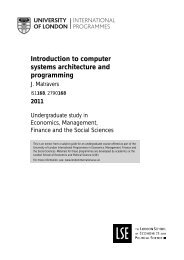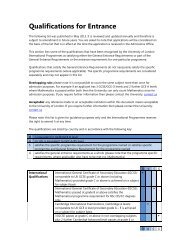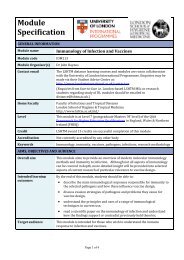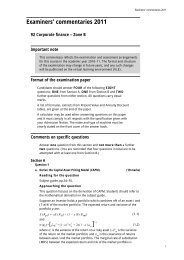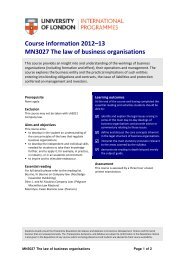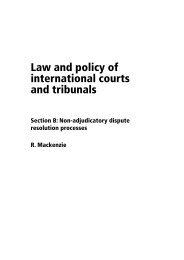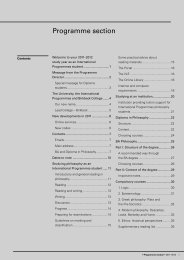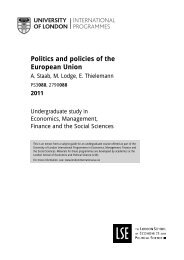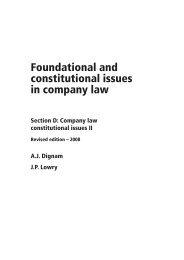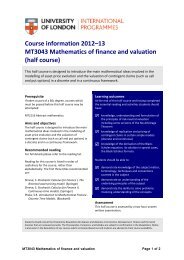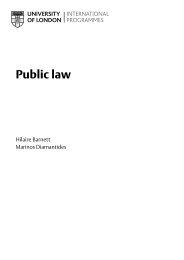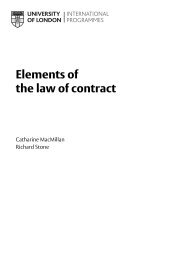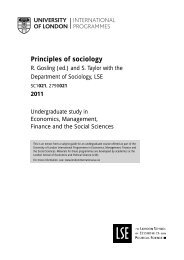2013–2014 Clinical Trials Epidemiology Global Health Policy ...
2013–2014 Clinical Trials Epidemiology Global Health Policy ...
2013–2014 Clinical Trials Epidemiology Global Health Policy ...
Create successful ePaper yourself
Turn your PDF publications into a flip-book with our unique Google optimized e-Paper software.
<strong>Epidemiology</strong><br />
A welcome from Anne Tholen (Course Director), Sara Thomas (Course Content Director)<br />
and Patrick Nguipdop Djomo (Deputy Course Director)<br />
Anne Tholen Sara Thomas Patrick<br />
Nguipdop<br />
Djomo<br />
The courses provide epidemiology training for<br />
professionals in academic departments, research<br />
modules or in the health services. They are suitable<br />
for those aiming for a career in epidemiology<br />
research, academics in other health areas and<br />
other health professionals. These courses are also of<br />
interest to people who require an understanding<br />
of epidemiology, such as medical journalists and<br />
scienti c o cers in government and industry.<br />
The study of epidemiology will give students a<br />
comprehensive understanding of basic concepts<br />
and methods in epidemiology, together<br />
with advanced skills in speci c applications<br />
of epidemiological research methods.<br />
<strong>Epidemiology</strong> is the key discipline<br />
underlying medical research, public<br />
health practice and health care<br />
evaluation. The understanding of<br />
its principles and practice is crucial<br />
for those involved in the design<br />
or assessment of epidemiological<br />
studies and programme evaluation.<br />
Epidemiological methods are<br />
also used to describe the size<br />
and nature of health problems,<br />
to investigate the aetiology of<br />
speci c diseases, and to evaluate<br />
the impact of interventions for<br />
treating and preventing ill health.<br />
These courses provide<br />
professional epidemiological<br />
For whom are the courses relevant? Entrance requirements<br />
Course objectives<br />
12 Postgraduate study in health<br />
All applicants are required<br />
to have:<br />
A second class honours degree<br />
or equivalent, from a university or<br />
other institution acceptable to the<br />
University of London, in healthrelated<br />
disciplines or in statistics or<br />
another appropriate subject. Work<br />
experience in a health sciences/<br />
health care setting is desirable but<br />
not essential. Applicants with an<br />
appropriate professional or technical<br />
quali cation in a health-related eld,<br />
which satis es the University as a<br />
quali cation equivalent to a second<br />
class honours degree, together<br />
with at least three years’ relevant<br />
experience, may also be considered<br />
on an individual basis.<br />
Students who do not satisfy the<br />
above requirements may still be<br />
admitted at the discretion of the<br />
School on the basis of their academic<br />
quali cations, work experience<br />
and references.<br />
All applicants must have an<br />
advanced level of ability to work in<br />
English. Applicants may be required<br />
to pass or to have passed within the<br />
last three years, at the appropriate<br />
level, a test of pro ciency in English<br />
acceptable to the University:<br />
training for people who cannot<br />
attend regular face-to-face<br />
classes. Study materials include<br />
stimulating computer-based<br />
sessions on CD-ROM, paper-based<br />
readings and exercises, and an<br />
internet-based discussion forum,<br />
allowing students to share their<br />
experiences and discuss their<br />
studies. Students bene t from<br />
contact with the student support<br />
team and receive academic<br />
support from tutors. We hope<br />
you enjoy participating in these<br />
courses, nd it a rewarding and<br />
stimulating experience, and one<br />
that enhances your career.<br />
The Princeton Test of English as a<br />
Foreign Language (TOEFL)<br />
– Paper-based Test: a minimum<br />
overall score of at 600 and<br />
a minimum of 5.0 in the<br />
test of written English.<br />
– Computer-based Test: a<br />
minimum overall score of at<br />
least 250 and a minimum of 5.0<br />
in the test of written English.<br />
– Internet-based Test: a minimum<br />
overall score of at least 100<br />
and a minimum of 5.0 in the<br />
test of written English.<br />
The British Council Test (IELTS)<br />
A minimum overall score of<br />
7.0 and a minimum of 7.0 in<br />
the written component.<br />
Please note: the <strong>Epidemiology</strong> modules are<br />
delivered through provision of interactive<br />
learning materials supplied on CD-ROM,<br />
supported by practical workbooks and/<br />
or readers. It is essential that all students<br />
have regular access to the internet (at<br />
least once a week) to participate in webbased<br />
discussions, access online library<br />
resources and submit assignments.<br />
Students must have a computer (see page<br />
9 for specifi cations) and are responsible for<br />
ensuring adequate system maintenance.<br />
Some software may not be compatible<br />
to use with Apple Mac computers.<br />
Students will also require a calculator.



